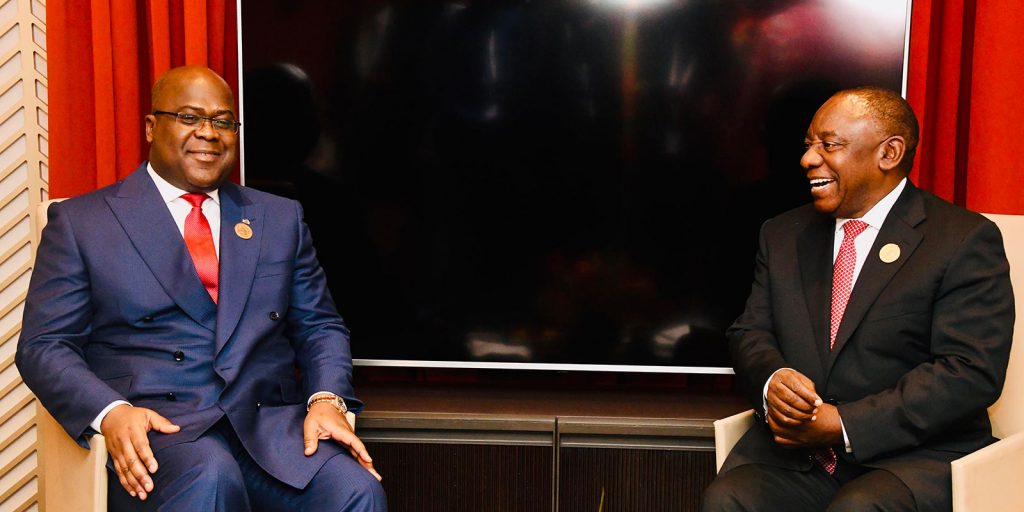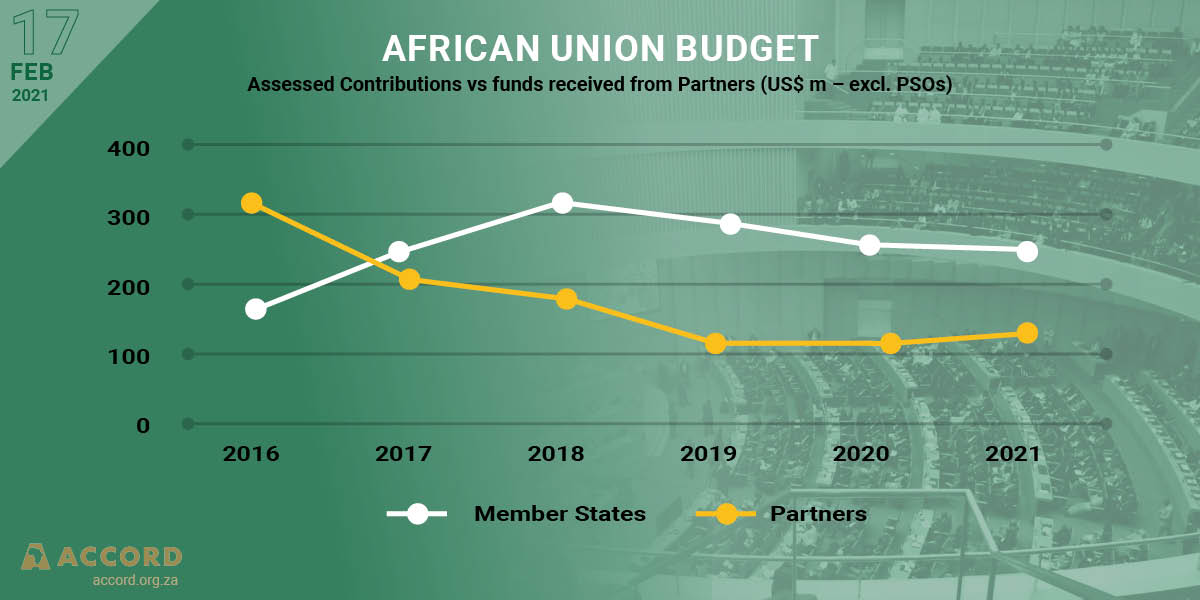New leadership team
In the election of the Chairperson of the AU Commission, the incumbent, Moussa Faki Mahamat, ran unopposed. In a show of overwhelming support for his re-election, he garnered the votes of 51 member states of the AU leading him to victory in the first round of the election, that took no more than a couple of minutes.
Vaccine nationalism and market-driven mechanisms are neither morally nor medically acceptable @DrTedros @WHO @SolomonADersso
Tweet
The election of the deputy chairperson, which had four candidates, although one was removed from the ballot before the election, culminated in the victory of Monique Nsanzabaganwa of Rwanda with 42 votes after three rounds of votes. The election for the post of Commissioner for Agriculture, Rural Development, Blue Economy and Sustainable Environment for which two candidates vied was won by the incumbent Ms Josefa Sacko of Angola with 51 votes. Albert Muchanga of Zambia, who was running for re-election as the only candidate for the position of Commissioner for Economic Development, Trade, Industry and Mining was re-elected with 44 votes. Similarly, Amani Abou-Zeid of Egypt, who was seeking re-election, received 50 votes for the position of Commissioner for Infrastructure and Energy.

Of particular significance is the election of the Commissioner for Political Affairs and Peace and Security, Bankole Adeoye, who was the only candidate for this position, with the unanimous vote of all member states of the AU, thus becoming the only one to receive all 55 votes. This outcome marks a change from the past. Adeoye will now be the first to lead the newly reorganized and what promises to be a highly influential portfolio, which is key for mobilizing the policy actions required for tackling both the democratic deficit challenges and the mounting threats to peace and security on the continent.
The election of the AU Commission was notable for a number of reasons. The election of two commissioners could not be held for lack of candidates from the regions that are qualified for filling those positions, namely West Africa and North Africa. It was the first time that this highly anticipated election was held on the basis of a virtual election system. Contrary to fears of many, the operation of the system proved to be smooth and efficient, despite unavoidable glitches. It dispelled the misgivings that some member states expressed and demonstrated the possibility for the AU to adapt and use new tools in the face of emerging challenges. Beyond the number of states who voted for him, the incumbent Mahamat made history by becoming the first AU Commission Chairperson to be re-elected. While Mahamat’s re-election represents continuity, the election of his deputy, Monique Nsanzabaganwa, marks a change in the leadership of the newly restructured Commission and becoming the first woman to assume this position.
#AU called for temporary WTO waiver of intellectual property obligations to enable the manufacture and distribution of COVID-19 vaccines in Africa #AUSummit2021 @SolomonADersso
Tweet
The AU’s response to COVID-19
Unsurprisingly, the AU’s response to the COVID-19 pandemic, on which the outgoing AU chairperson President Ramaphosa presented a report to the Assembly, was the substantive agenda item that received the most attention during the summit deliberations. In addition to President Ramaphosa’s call on international financial institutions for granting access to concessional finance and new special drawing rights with bias to the developing world, the focus was mainly on Africa’s access to the COVID-19 vaccine. The continent, which has a very narrow path for access, will need 1.5 billion doses of vaccine in order to vaccinate 60% of its population—the estimated minimum requirement for achieving ‘herd’ immunity. As discussed in another analysis, apart from presenting the options for financing the acquisition and delivery of the vaccine doses, the summit adopted a decision which expanded the scope of the AU strategy on access to the COVID-19 vaccine to include the temporary waiver by the WTO of specific aspects of intellectual property obligations relating to the prevention and treatment of COVID-19.
As the World Health Organization (WHO) pointed out, the most effective way for equitable and speedy access to the vaccine is through sharing vaccine manufacturing technology, intellectual property and know-how through the COVID-19 Technology Access Pool, temporarily waiving intellectual property barriers. The AU’s collective endorsement of the call for waiving patents relating to COVID-19 vaccine, for which the African Commission on Human and Peoples’ Rights campaigned for months on the basis of its Resolution 449, is a crucial and most effective means to address this ‘artificial scarcity’, resulting from ‘vaccine nationalism’ and ‘market-driven mechanisms’. As the WHO’s Director-General, Dr. Tedros Adhanom Ghebreyesus explained, vaccine nationalism and market-driven mechanisms are neither morally nor medically acceptable, because “allowing the majority of the world’s population to go unvaccinated will not only perpetuate needless illness and deaths and the pain of ongoing lockdowns, but also spawn new virus mutations as COVID-19 continues to spread among unprotected populations.”
President @CyrilRamaphosa, outgoing chair of the @_AfricanUnion called for the institutionalization of the office of the AU Special Envoy for Women, Peace and Security #AUSummit2021 @SolomonADersso
Tweet
Peace and security
Although conspicuously absent from the AU summit agenda due to the non-inclusion of the report of the Peace and Security Council on its activities and on the state of peace and security in Africa, peace and security was a common theme in the speeches of the outgoing and in-coming Chairpersons of the AU, and the AU Commission Chairperson.
Not surprisingly the challenges to peace and security, which increased considerably in 2020 as documented in the reports of ICG, ACLED and Amani Africa, were highlighted, albeit in general terms, as a priority area. This was evident from both the 2021 AU Chairperson President Tshisekedi, who noted violent conflicts in various parts of the continent including in eastern parts of his own country as a daunting challenge, and Mahamat, who in one of his speeches listed the challenges to silencing the guns– including the rise of violent extremism, … post-electoral conflicts, recurrent attacks by terrorist groups (and armed militias) …various socio-political expressions (against) governance deficit. Also of specific significant note is the call of President Ramaphosa for the institutionalization of the office of the AU Special Envoy for Women, Peace and Security.
Arts, culture and heritage
The AU summit also launched the theme of the year ‘Arts, culture and Heritage: Levers for building the Africa we want’. In his speech, Tshisekedi announced his plan of taking the AU away from meeting rooms and the AU Commission into public spaces including class rooms, farms and villages, refugee camps and markets, in order to bring the Union closer to the public. The theme of the year offers the vehicle for achieving this ambition through collaboration with African artists in the creative industry.
Solomon Ayele Dersso, PhD is the founding director of Amani Africa, Addis Ababa based Pan-African policy research, training and consulting think tank that works on African Union affairs.


